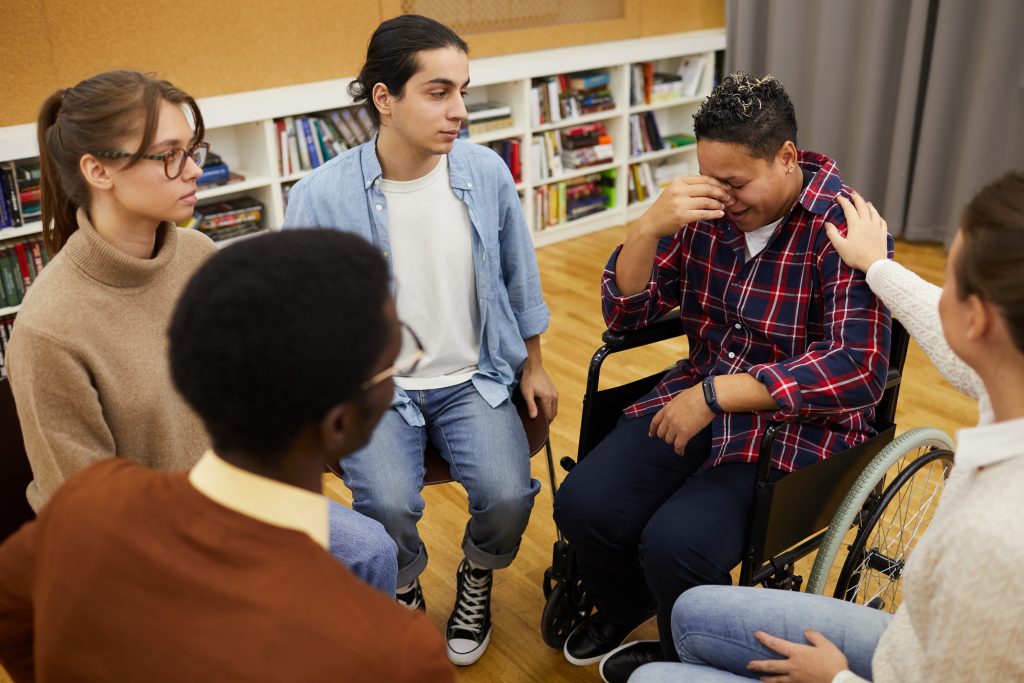Watching your loved one struggle with drug addiction can be difficult and frustrating. Things can even be worse when they don’t want to accept the situation and deal with it. The denial is usually a significant obstacle in recovery, and unless you think outside the box, things can only worsen.
In such a case, an intervention may be necessary to help them see the problem. Although your heart is breaking and you are genuinely concerned about the situation, you should be aware of your reactions. While the situation may be calling for immediate action, some reactions can be more destructive than useful.
Interventions are designed to encourage the victim struggling with addiction seek professional help. Therefore, you need to have a plan. A good intervention is much more than the classic family meeting frequently displayed in leading media.
So, what is intervention, and how can you plan an effective intervention that will help your loved one? Read on to find out everything you need to know.
What Is an Intervention?
An intervention is a process of getting a drug addict into treatment for their drug abuse disorder. It involves talking to the victim and helping them see the problems caused by their actions – physical, mental, and social.
If they do not recognize that there is a problem or accept that they need urgent help, intervention might not result in immediate positive effects and could have the opposite effect. This is because intervention requires some effort on their part to seek help.

If you are planning an intervention for your loved one, it would be best if they do not know about it. If they know that you plan to talk to them about their situation, they might avoid the meeting altogether or become defensive.
Sometimes, your attitude and behavior during the intervention could be mistaken for confrontation, which will make them feel hurt or ashamed to communicate with you.
Who Should Stage Intervention?
Friends and family members are the best people to stage an intervention. This means you should plan this meeting in a neutral location, so your loved one doesn’t suspect anything.
Because of the sensitive nature of the issue, it is advisable that the number of people involved in planning and attending be kept minimal. Include only people who are 100% supportive and positive about the victim’s situation.
Ensure you talk with everyone who is going to attend before planning a time for the intervention. If they have any concerns, try to explain your reasons for staging this meeting in a way that will make them more comfortable participating in it.
How to Stage an Intervention
There are five basic steps involved in planning and staging a successful intervention. The steps are explained below:
1. Developing a Strategy
An intervention cannot be called successful unless it is properly planned. Define the main purpose of the meeting, who will attend, what message each person will deliver during the meeting, how long the meeting will last (of which you should make sure to take breaks), and how it will end.
2. Conducting Background Work
Carry out background work before the actual intervention takes place. This means finding resources, reading literature on addiction treatment centers, talking to friends about their experiences with drug abuse, gaining knowledge of available rehab centers, etc.

Make sure to have a variety of information at your disposal that can be helpful to the victim. Don’t put yourself in a situation where the victim is willing to take action but you can’t offer proper guidance.
3. Preparing for the Meeting
You must prepare carefully for this meeting so that it goes smoothly and according to plan. Finalize the venue, take care of food arrangements, ensure everyone is informed about the time and location, etc. Make sure you have all details arranged beforehand, so there are no hiccups during the intervention.
4. Conducting the Actual Intervention
When you call your loved one for the meeting, make sure to start with small talk and casual conversation before getting down to business. This will put their mind at ease about attending the meeting, and they will be more open to listening to what everyone has to say.
Aim to have them agree that they need professional help before the meeting ends. If they are already adamant about not seeking help, then try to find out their concerns and address these issues during the meeting.
5. Following Through after Stage Intervention
The best part of an intervention is when your loved one realizes they need treatment for their drug addiction or behavior problem. But the worst part is when they refuse to accept help and return home.
As soon as your loved one agrees to seek treatment, make sure you schedule an appointment at a reputable drug rehabilitation center so they can start their recovery journey right away.
Make sure you follow up on this meeting and coordinate with their therapist to attend subsequent sessions you may hold to assess progress.
When you stage an intervention, everyone involved must follow through with their part of the plan so that your loved one gets help immediately after the meeting. Just arranging the meeting without making sure they agree to recovery and following up on it later doesn’t help.
When to Stage an Intervention
It is difficult to know when you should stage an addiction intervention. The best way is to take note of all the possible drug addiction signs and talk to your loved one as soon as you recognize these signs.
If they refuse to listen, you can hold an intervention at a time that works best for everyone involved.
Most people realize they have a problem once their family, friends, and colleagues become aware that they have a drug addiction disorder. This is the best time for you to stage an intervention, as your loved one will be more open to treatment once their circle of influence comes together to convince them it’s the right thing to do.

If a person is still abusing drugs even after family members or friends have become aware of it, you should also plan staging an intervention before things get out of hand..
But if the person has hit rock bottom and is refusing to get help or becoming extremely defensive when confronted with this issue, it is best to call in professional help before staging an intervention.
Summary
Intervention is a complicated process and requires professional help from drug interventionists to ensure everyone gets through it emotionally. But if done right, an addiction intervention could be what your loved one needs to recover from their drug misuse disorder.
You need to gather all the courage and determination necessary to hold such a meeting and convince your loved one to seek treatment. Make sure you have a plan beforehand and follow through with it until your loved one agrees to recovery.
If you or your loved one is struggling with opioid addiction, we can help! We have a team of experienced Suboxone doctors that will assess your situation and develop a personalized Suboxone treatment plan. Contact us today to find out a Suboxone doctor near you.



